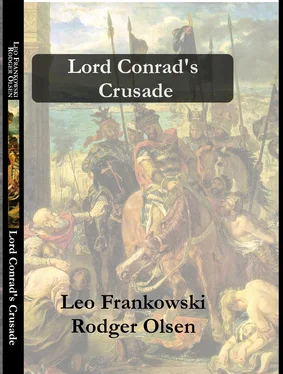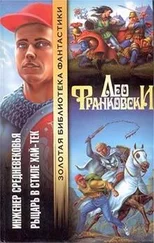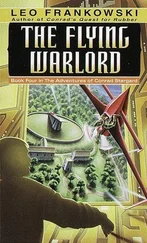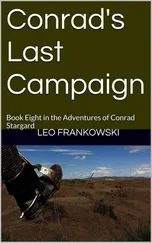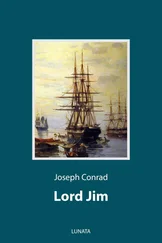Лео Франковски - Lord Conrad's Crusade
Здесь есть возможность читать онлайн «Лео Франковски - Lord Conrad's Crusade» весь текст электронной книги совершенно бесплатно (целиком полную версию без сокращений). В некоторых случаях можно слушать аудио, скачать через торрент в формате fb2 и присутствует краткое содержание. Год выпуска: 2014, Издательство: Great Authors Online, Жанр: Альтернативная история, на английском языке. Описание произведения, (предисловие) а так же отзывы посетителей доступны на портале библиотеки ЛибКат.
- Название:Lord Conrad's Crusade
- Автор:
- Издательство:Great Authors Online
- Жанр:
- Год:2014
- ISBN:нет данных
- Рейтинг книги:3 / 5. Голосов: 1
-
Избранное:Добавить в избранное
- Отзывы:
-
Ваша оценка:
- 60
- 1
- 2
- 3
- 4
- 5
Lord Conrad's Crusade: краткое содержание, описание и аннотация
Предлагаем к чтению аннотацию, описание, краткое содержание или предисловие (зависит от того, что написал сам автор книги «Lord Conrad's Crusade»). Если вы не нашли необходимую информацию о книге — напишите в комментариях, мы постараемся отыскать её.
Lord Conrad's Crusade — читать онлайн бесплатно полную книгу (весь текст) целиком
Ниже представлен текст книги, разбитый по страницам. Система сохранения места последней прочитанной страницы, позволяет с удобством читать онлайн бесплатно книгу «Lord Conrad's Crusade», без необходимости каждый раз заново искать на чём Вы остановились. Поставьте закладку, и сможете в любой момент перейти на страницу, на которой закончили чтение.
Интервал:
Закладка:
In the morning we left for Sieciechów, crossing the Vistula on a ferry powered by the river itself that I had designed myself many years ago.
The day after, we rode by the construction site of my new city of Warsaw, which was to be a combination of a university town, a tourist trap, a diplomatic center, and a trade center. But they were only putting the foundations in now, and there wasn’t much to see, so we rode on.
The next three days took us through Płock, Toruń, and finally to Gdańsk, one of Poland’s two major seaports on the Baltic Sea.
We soon discovered that one of our patrol ships, an Explorer class vessel called the Pride of Gdańsk , would be leaving in a few hours, heading east.
The army’s usual practice was to divide the seas and ocean coasts up into “patrols” that took one of our ships about two weeks to sail the circumference. Explorer class ships were equipped with lighters, small cargo boats that didn’t need much of a harbor to operate out of. The ship sailed slowly onward, while the fast, steam-powered lighters scurried back and forth between the ship and a series of trading posts on the shore.
The infrastructure of most places wasn’t well-developed yet, and this system let us pick up and deliver cargo and passengers from nothing but a small dock, or even just a beach.
At a decent harbor, the ship could come in and transfer a lot of cargo and people easily. But we could pick up the small stuff, too.
Once there was volume enough to justify it, a second ship was added to the patrol, going around in the opposite direction. The Baltic Patrol, being our oldest, now had four ships. Every point around the southern shore could ship or receive things or people twice a week, on the average.
We had started to build a much larger and faster class of ships, the Liners , which were intended to travel between the various patrols, stopping only at improved harbors with specially built docks.
I booked us a couple of cabins, one of which was for Silver, and when they found out who I was, they wouldn’t take my money. Naturally, I had stayed at my own inns for free, and we hadn’t bought anything on the trip yet, so thus far we hadn’t spent anything at all on my vacation.
The ship’s commander, Captain Sliwa, was delighted to have us on board, and insisted that we eat at his table.
The good captain had a wife and two servants, servants being a euphemism for the additional wives permitted by army regulations for our higher ranking members, but frowned on by the church. They all worked on the ship, part-time because of their children, and were paid for it, as well as getting their share of the ship’s profits.
The economic arrangements on shipboard were similar to those of a landed company. The ship itself was owned by the army, and rented to the crew. After all salaries and expenses were paid, the army split what was left with the people aboard, in accordance with their rank.
If they ran at a loss, they still got their pay and benefits, but they had to make up the loss before they got any profits.
A crew that perennially ran at a loss was eventually replaced.
There were about four dozen fulltime warriors on the ship, about a fifth of a usual company. But Sliwa was also the commander of the other three ships in the Baltic patrol. Also, there were always some people on leave, in school, or sick, so he commanded an average sized company.
Dinner was served in the captain’s day room, a small room with plain, painted ferrocrete walls and ceiling. A carpet and a few handicrafts had obviously been added by the captain’s wives, which gave it a bit of a homey feeling. Still, a palace, it wasn’t.
At dinner with the captain and his wives, I asked, “Are there any things of particular interest on the Baltic?”
“Well, that of course depends on what you are interested in. Since you yourself had a major hand in her design, the operations of my ship might interest you. Then, there are four decent cities on our route. Gdańsk and Szczecin Harbor were both recently built by the army, so while they are clean and well designed, they don’t have a great deal of architectural interest.”
“Is that a complaint?” I asked.
“Not really, my lord. In order to save our country, and the whole of Christendom besides, the army has to do things quickly, in the most efficient manner possible. We simply have not had the time and energy to build things beautifully, besides. Some day, though, I hope that it will be possible to change the emphasis, a bit.”
“A good thought that, yes.”
“We’ll be at Tallinn in two days, and we always try to stop there for a few hours. It has a fine harbor, and it is almost as clean as an army city. That, and it’s a remarkably beautiful city as well. Eight days after that, we will be in Copenhagen, and it too deserves a good looking over.”
“Thank you. We’ll do that. I’d been thinking in terms of getting off in Copenhagen, and linking up with the North Sea patrol there.”
“That’s the place to do it, my lord.”
When dinner was over, and the captain brought out flask of brandy and a small, hand-made box. As soon as his wives saw it, they quickly cleared the table and departed, although Cynthia stayed with us. He poured us each a small glass of the distilled wine, a recent product made in France from inferior grapes, and opened the box.
“Are you familiar with these, my lord?”
“By God, those look like cigars!” They looked to be made of single leaves of tobacco, rolled up tightly, and then dried.
“I’d never heard of a name for them before. They were sent to me by an old friend, the captain of one of the explorer companies investigating the Caribbean Sea. The natives there light them afire and inhale the smoke. I rather like it, but my wives hate the smell.”
“That is a common household problem where I once lived. But I haven’t had a smoke in almost thirty years! I didn’t even know that such a thing was available!”
“Blame it all on that ‘chain of command’ system of yours, where everything has to ‘go through channels.’ They will probably filter up to you in a year or two. I got these a month ago, with a request that I evaluate them, to see if there was any market. But you are familiar with these things?”
“Oh yes, and once I was probably addicted to something similar. But the craving never ends, and I would dearly like to try one of them.”
“Then please enjoy,” he said handing me one of the lighters that I’d had a hand in designing.
I inhaled, and the rough, acrid taste scorched my throat and made me cough.
“It’s a little crude, but selective breeding and better curing methods will solve that. None the less, it is a lovely thing!”
We smoked and sipped the brandy in silence, for as Kipling said, conversation ruins good smoke. Eventually, we had a second cigar each, and several glasses of brandy. I saw no reason to restrict the use of tobacco in Europe. I mean, we already had a cure for cancer, so what harm could it do?
“I wish that I had more of these to give you, my lord, but I only have a few left.”
“Don’t worry about it. In a month or so I’ll have a case of them sent to you, and another sent to myself.”
Seventy-two standard cases fit neatly into a standard army container. They were each a yard long, a half yard wide, and a half yard high. Empty, they made a convenient bench. All of our jars, cans, and bottles were similarly standardized and re-usable, with everything fitting neatly into cases. When you bought something, you also bought the container it came in, but we’d always buy the container back at the same price, if it was clean and in good shape. An efficient system.
Читать дальшеИнтервал:
Закладка:
Похожие книги на «Lord Conrad's Crusade»
Представляем Вашему вниманию похожие книги на «Lord Conrad's Crusade» списком для выбора. Мы отобрали схожую по названию и смыслу литературу в надежде предоставить читателям больше вариантов отыскать новые, интересные, ещё непрочитанные произведения.
Обсуждение, отзывы о книге «Lord Conrad's Crusade» и просто собственные мнения читателей. Оставьте ваши комментарии, напишите, что Вы думаете о произведении, его смысле или главных героях. Укажите что конкретно понравилось, а что нет, и почему Вы так считаете.
